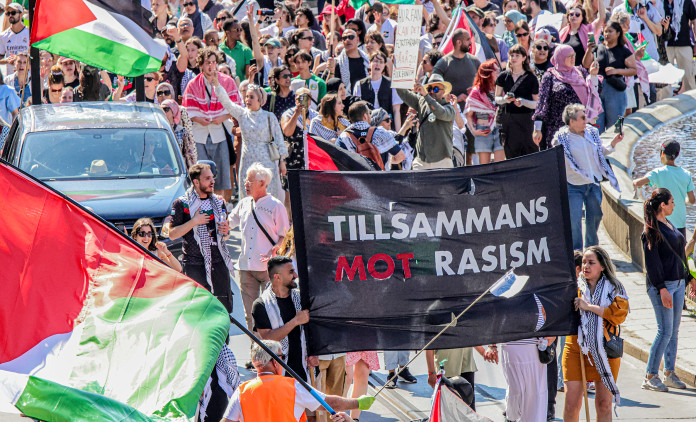Per Olsson is a member of Socialistiskt Alternativ (ISA in Sweden)
The EU elections disaster of the ruling party, President Macron’s Renaissance Party, has led to the calling of new general elections in France, with the first round to be held on 30 June and the second round on 7 July. It is the EU governments’ austerity policies, racism and blame game that have played into the hands of the far-right.
In France, the far-right Rassemblement National (RN) became by far the largest party with over 31% of the vote, compared to 14.5% for the electoral coalition to which the president’s party belongs. Another far-right and anti-refugee party, Reconquête, won just over 5% of the vote. The upcoming French elections threaten to be a major success for the far right.
In Germany, the election was a disaster not least for the ruling Social Democratic Party (SPD), which received only 13.9% of the vote. The far-right Alternative for Germany (AfD) became the second largest party, and in the east of the country the AfD became the largest party. The traditional right-wing CDU/CSU won the most votes in the German EU elections. In Austria and Italy, the far-right Freedom Party and the Brothers of Italy, a party with fascist roots, won the elections.
Although the European elections are even less indicative of the prevailing mood than normal elections, the results reflect the depth of the crisis of European capitalism and the fact that there is no return to any kind of equilibrium and stability.
As in previous European elections, this year’s vote was in many cases a vote of no confidence in the governments in power. However, unlike the last European elections in 2019, this did not materialise in a ‘green wave’, with the allegedly green parties gaining as a result of the global climate strikes highlighting the climate and environmental crisis. Since then, the ‘green’ parties have been exposed as no challenge to the system that continues to devastate the planet. There have been many betrayals of the climate and peace (anti-militarism) struggle, which were paid for in the European elections.
The retreat and betrayal of the ‘green’ parties has created an even greater political vacuum and contributed to increased political disorientation and confusion, especially among young people.
In the growing political vacuum and in the absence of a strong socialist left to give a political voice to workers and struggles, far-right racist parties have been able to feed on the discontent that exists. They have also managed to consolidate their position among their supporters.
However, the picture is not uniform. In the Nordic countries, there was at least a left-wing breeze and in Hungary, for example, the ruling far-right Fidesz, Prime Minister Orbán’s party, had its worst election since 2010. In Poland, the nationalist and anti-feminist Law and Justice (PiS) party lost almost 10 percentage points compared to the last EU elections.
In the European elections, the so-called centre, where the Liberals but also the Greens and Social Democrats want to position themselves, were the big losers. In Germany and Denmark, the Social Democrats had their worst election results ever. In the EU as a whole, the Liberal and Green parties fared the worst. The Liberal group RE in the European Parliament lost the most seats of any group — minus 19 seats — closely followed by the Greens/EFA, which lost 18 seats.
The European elections send a warning that must be answered by struggle, not least from the trade unions and the anti-capitalist left. The success of the far-right tends to poison the social climate, raising further complications for the struggle and adding to political confusion. At the same time it becomes an excuse for governments to sharpen right-wing policies with new attacks on the working class and move forward in building Fortress Europe. This is done by unpopular governments whose position is constantly undermined by the multiple crises of capitalism in a weakened EU that is losing ground to competing capitalist classes in North America and China/Asia.
The right-wing reaction, the whip of counter-revolution, and the polarization that is now most noticeable on the right is also giving birth to a counter-reaction: a willingness to come together in active resistance to the extreme right and its divisive racism. The mass demonstrations in Germany against the AfD were an expression of this, but one which the German left, Die Linke, was politically unable to capitalize on.
Fighting back against right-wing reaction requires linking the struggle in the streets and squares to the workplaces and to the building of the socialist revolutionary mass force needed to abolish the oppressive capitalism that breeds and fuels racism and nationalist division.
The will for change is there. Right-wing politics and the threat of the far right are fuelling a left-wing backlash, of which the European elections in Denmark, Finland and Sweden provided at least a glimpse.




